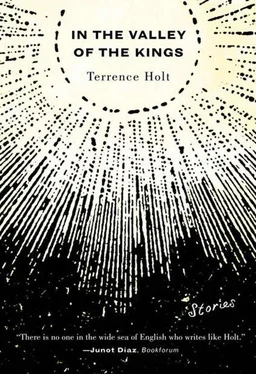I have resolved to try the Egyptian way. Especially now, when what was once a nameless urge has become an urgent need, and I find — as if I had known a spell for finding — the King I seek, his dwelling place, and over five millennia begin to feel his agony. And find he has a word.
I seek a word of power.

THE——FOUNDATION——Fifth Avenue
New York, NY——
14 May 19—
Dr.—
Department of Archaeology — University—,——
Dear Dr.—:
We regret

From the King-lists of the chroniclers a name was stricken — as over the three millennia the chronicles record so many were expunged. Khufu, who bled the kingdom for his pyramid, finds his name written in only four instances — and none of those upon the tomb itself. This was the revenge of those who followed him: he descended nameless into his horizon; nameless, into a realm where possession of a name was the last defense against annihilation. Without a name, not even a mountain of stone could ensure his immortality. Today the sarcophagus of Khufu is an empty tub of granite within an empty chamber.
Worse befell Radedef, who followed Khufu, ruining the Black Land to build his pyramid on an eminence above the plain of Giza, from the top of which he hoped to look down upon the pyramid we call the Great, in the days when it stood gleaming, white and perfect. Radedef’s monument they toppled, and left not even rubble. Akhenaten’s great city lay in ruin within a century of his death, razed by the Ramesside kings in their campaign to eradicate the memory of “That Criminal.” The blocks of his temples, the stelae celebrating the founding of his holy city, have been found shoring up the foundations of Horemheb’s pylons at Karnak, of Seti’s hypostyle hall: the name of the heretic king has been gouged from his cartouche. The bodies of the royal family were removed from the tomb at Amarna, brought to Thebes and there desecrated in an official rite, the monuments, the name, the flesh, the soul scattered on the Libyan wind.
But something else — no mere censorship after the fact — transpired in the twenty-fifth century B.C.E., somewhere between Thebes and Memphis. For it is not, I know, merely the effacement of a despot’s name I have discovered. Not a word has survived . Surely such an absolute void speaks more loudly of a secret than any muttering of fragments ever did. I am convinced that something silenced the Egyptian people themselves, and held them so enthralled over a generation. What else could account for this perfect silence? Something — someone— must have silenced the entire people.
I say again: for an entire generation not a word was spoken. Stop for a moment and consider. Not whatever you see rise before you even now — how dismally flapped the sails along the wharfs, how fearfully the echoes fled among the lotus-headed columns, how balefully glared the priests at their only hope of power in the world to come denied them — not those, not those at all. I do not speak figuratively . But consider how this smoke that rises from the page blinds you: how, in the clamor of speech, the thing almost escaped you. The words might have passed before your eyes and you gone on unknowing, incapable of recognizing the thing itself without its ceremental shroud, this dull dreaming we do instead of thinking, and the silence gone unrecognized. In a moment such as that, I stopped, I listened , and heard what none before me had. No one spoke .
We think we understand the torrent of speech that bursts out of every Egyptian tomb and temple, the glyphs like locusts crawling everywhere, a plague consuming stone. We know the signs, we can construct a grammar. But do we apprehend the flood itself? How much more difficult to know the channel of the flood, or the darkness from which it bursts.
Before Egypt, the record of the past is scattered slabs of incised clay memorializing: what? Tallies of sheep and grain. A battle, a building, a banality that might have constituted all the history of our kind but for the uncanny efflorescence of Egyptian. With the rise of civilization in the Nile, language explodes, a universal shout reverberating to this day so loudly it still fills our ears: we cannot articulate it from the noise of our thinking. We cannot comprehend it, nor how deeply they appreciated its function in their world. This was a people for whom speech was actually life and death: whose funerary rite consummated in the Opening of the Mouth, that the dead could speak the spells of power in the underworld, and prevent his dying there a second time.
Spells . Childish superstition. Picturesque nonsense. Has it occurred to no one that the most breathtaking omission in the record may be not in Egypt’s chronicles but in our comprehension? How is it that no one— no one —has given even a passing thought to the possibility that the Egyptian texts were something more than superstition? What people wastes itself on dreams? Waste themselves they might have, had their understanding been as limited as ours. The Egyptians evidently needed to make their spells material. It is this emphasis on the physicality of the word, its translation from thought to sound to durable object, that seems to have consumed them to the point that they gave over lifetimes by the thousand to achieve this metamorphosis — and make it last.
They labored, in a way we cannot begin to imagine, driven by something passing our comprehension, at the hardest materials they could find, the stuff of which they built their passage to eternity. In stone cut and dressed and piled mountain high as if with only this purpose they carved, laboriously, with instruments barely harder than the stone itself, year after year these childish, superstitious, picturesque, nonsensical, fabulous, infinitely variable glyphs that speak insistently and everywhere of one thing only: the survival of the spirit beyond death. Only amid this clamorous beseeching, this vocal assault on the obduracy of the world, does the silence annihilating Egypt assume its true significance. What could have silenced such a people? What could have stifled a need that until then had triumphed over the most intractable elements of the material world? Even now, with the pieces of the answer all at hand, I am unable to say.
And that inability, I fear, has been my undoing. “Insufficient evidence,” the Foundation says. What more evidence must I produce? What evidence can I? I could have revealed my theft of the urn from Nur-Mar’s tomb. It would have been enough. Perhaps I would have escaped censure.
But were I to have revealed, even in so obscure a document as a grant proposal, the existence of the papyrus of Nur-Mar, I do not doubt disaster would have followed. The map would have dispersed itself into the public domain, and all associated with it — the tomb, the spells, and — all else, all else — become the idle stuff of tabloids. A million people chanting the name of the nameless one and all would have been lost — for him, and for me. If I know nothing else I know this: the silence was essential.
But now, because of that same silence, all has been lost. For without that grant, I cannot go into Egypt. And go to Egypt now I must, and find the tomb, and learn the Word, while I still have voice to utter it.

Even before the Foundation uttered its anemic curse, I doubt I still believed in the possibility of mounting an expedition. It was plain to me that I was dying. The only mystery remaining was the ordering of events: At what stage would I be incapacitated? And how? How many days and nights would I lie abed with death until it took me?
Читать дальше













